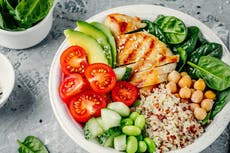Food companies attack government plan to ban junk food adverts online
Kellogg’s, Britvic and Mars are among 3,000 brands urging a rethink on the proposed restrictions
Some of the leading food companies in the UK have criticised the British government over a plan that could see online junk food advertising banned in a bid to tackle childhood obesity.
In a letter led by the Food and Drink Federation (FDF) and signed by at least 800 food and drink manufacturers and 3,000 UK brands, companies urged Boris Johnson’s government to reconsider the proposal.
Initially, the government had planned to ban junk food from appearing online and in TV commercials before 9pm in a bid to help children and their families make “healthier choices”.
The effort was strengthened this month, however, as Mr Johnson sought to do more to address growing rates of obesity in Britain after being admitted to hospital with the coronavirus.
Previously, Mr Johnson has said he was too “overweight”. And with figures from Public Health England suggesting that those who are clinically obese are more likely to suffer serious health consequences if they contract Covid-19, the prime minister has ramped up his efforts to tackle the trend.
If the proposed ban on junk food advertising, which is still under consultation, is approved, it could see the UK introduce some of the most strict digital marketing rules in the world by the end of this year.
In their letter to Mr Johnson’s government, hundreds of food companies, including Kellogg’s, Mars, and Haribo, condemned the plan.
In the letter food companies say that while they support the government’s efforts to tackle obesity, they feel the proposal is “disproportionate" and insufficiently substantiated.
"The UK government is quite correctly committed to evidence-based policymaking. However, the evidence base underpinning these proposals is lacking in both detail and efficacy," the letter states.
“Additionally, there is still no agreed definition of which foods the government is including in these proposals,” it continues, adding: "They are so broad they even capture family favourites from chocolate to peanut butter to sausage rolls."
Rather than banning all junk food advertising, the brands said advertisers could instead use advanced online tools to target adult audiences and avoid marketing to children.
In the midst of the coronavirus pandemic, part of Mr Johnson’s bid to tackle obesity has been aimed at reducing pressure on UK hospitals.
According to data published by the National Health Service (NHS) in May, at least 11,117 hospital admissions between 1 April 2018, and 31 December 2019, were attributable to obesity.
The number represented a 4 per cent increase in admissions from 2017-18, when the NHS saw a total of 10,660 admissions attributed to obesity.
Those numbers, however, do not include hospital admissions where obesity was only considered a factor, with 876,000 admissions being connected to obesity in some way in 2018-19, representing a 23 per cent increase from 2017-18.
In a statement a spokesperson for the Department of Health and Social Care said the government was "determined to tackle obesity across all ages".
Noting that the government has "committed to restricting HFSS [high-fat, sugar and salt foods] adverts on television before 9pm," the spokesperson said: "We also need to go further to address how children can be influenced online by adverts promoting unhealthy foods."
Join our commenting forum
Join thought-provoking conversations, follow other Independent readers and see their replies
Comments
Bookmark popover
Removed from bookmarks